Getting natural backlinks is a must-do if you plan to generate better ROI and get more clients for your business. For this, you will need your website to rank high on Google.
But what exactly are natural backlinks?
They’re like other websites saying your content is good and totally worth a look.
In other words, when someone links to your site because they genuinely like and find your content valuable, that’s a natural backlink.
These links are 100% compliant with Google’s Webmaster Guidelines because they happen naturally and aren't artificially placed or paid for.
Natural backlinks are a major factor in how Google ranks web pages.
They show that other sites trust your content, which can lead to more organic traffic.
According to Backlinko, pages that have a higher number of backlinks typically appear higher in search rankings compared to those with fewer backlinks.
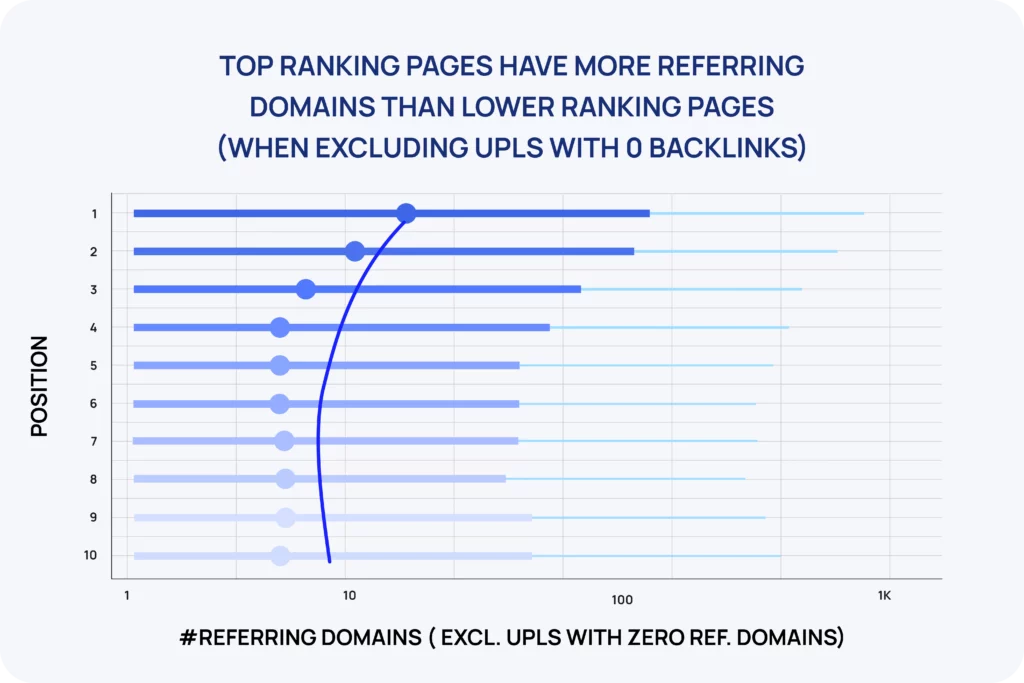
🔗 Related article: How Many Backlinks Do I Need To Rank
So, how do you get these natural links? Well, that’s what we’re here to explore in this article. Read on!
Difference Between Natural and Unnatural Backlinks
So natural backlinks are those you earn organically. Someone could say these are the ones you get without even trying. After all, they come from others finding your content valuable and worth sharing.
Still, you have to create these linkable assets first. This can be a cool free tool, industry research, a handy checklist, an eye-catching infographic, or an in-depth report.
Unnatural backlinks are a different story.
These are links created just to fool Google into thinking a site is more important than it really is. According to Google’s Webmaster Guidelines, such links are made through deceptive practices, like buying links or exchanging them.
Google doesn't like these at all and sees them as spammy. Plus, these can get your site penalized.
So, it’s better to focus on earning natural backlinks that truly add value and improve the user experience (UX).
If you’re looking to build a solid backlink profile, our team of professionals is at your service. At Editorial.Link, we specialize in earning natural backlinks from reputable sites. We collaborate with renowned companies like Envato and HubSpot to ensure you get high-authority, contextually relevant links that work. No matter your site's DR or DA.
High-quality links
High-quality links come from websites that are trustworthy and relevant to your field.
Imagine a site that regularly updates its content about topics similar to yours, doesn’t link out to sketchy or spammy sites, and clearly marks any sponsored content.
Done?
Good.
That is exactly the type of site seen as reliable, especially if it shows up in places like Google News.
It's also better if the links come from articles written by the site’s staff writers, rather than guest contributors who might have paid to get their links included.
In essence, quality links are about trust and relevance.
By the way, a whopping 84.6% of respondents from our recent survey said relevance is the top metric for judging backlink quality.
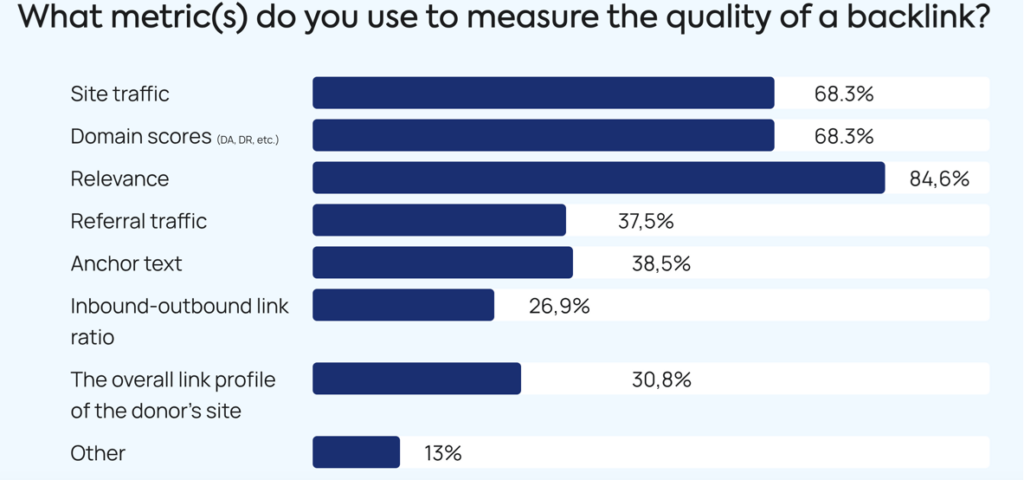
What’s a good link?
A good link helps your site with little risk involved. The specifics can vary.
For example, links from local directories might be great for local link building but not so much for national SEO.
Whether you believe that every link you try to get is unnatural or that any meaningful link counts as natural, the most valuable backlinks have a few key traits.
- First, they fit naturally within the content, meaning the surrounding text is relevant to what’s on the target page.
- Second, they provide real value to readers, offering additional information that enhances understanding of a topic.
- Lastly, the anchor text is thoughtfully integrated, making sense within the page's content.
Additionally, sites that regularly update and remove old or broken links can be more beneficial.
Each link should be looked at individually. Even a new blog with a small but engaged audience can be valuable if it has great content and dedicated readers.
Why Natural Link Building is Vital
Say you’ve got your site up and running, and your content is rolling out.
Now the big question is: why should you focus on natural link building?
The main reasons are quite straightforward and impactful.
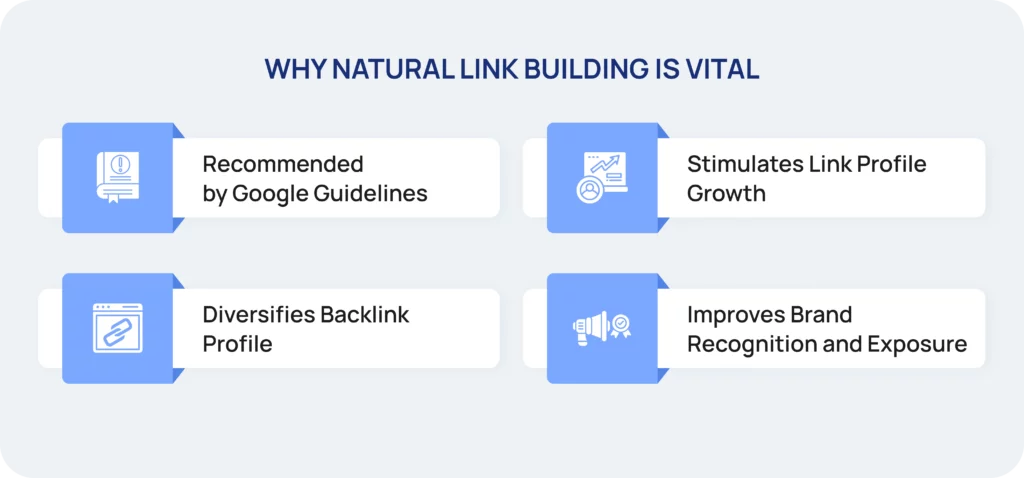
Recommended by Google guidelines
Google, the big boss of search engines, values authenticity and relevance. They want search results to be trustworthy and useful.
Natural link building fits perfectly into this because, as you already know, these links are earned, not bought or manipulated.
According to Google's guidelines, natural links show that your content is valuable enough for other sites to reference without any strings attached.
Diversifies your backlink profile
Natural link building adds a mix of different types of links to your profile. This variety makes your backlink profile look organic and well-rounded. Which is something every site owner should be looking forward to.
When you only rely on a single type of link-building strategy, your profile can look suspiciously over-optimized. Natural links, coming from various sources, keep your backlink profile healthy and diverse.
Stimulates continuous link profile growth
This type of link building is not a one-time effort.
When you create high-quality content that others want to link to, you set off a chain reaction. Each new piece of content can attract more links over time, steadily growing your link profile.
In fact, a solid 71.1% of SEO professionals think you can achieve high Google rankings with just quality content alone.
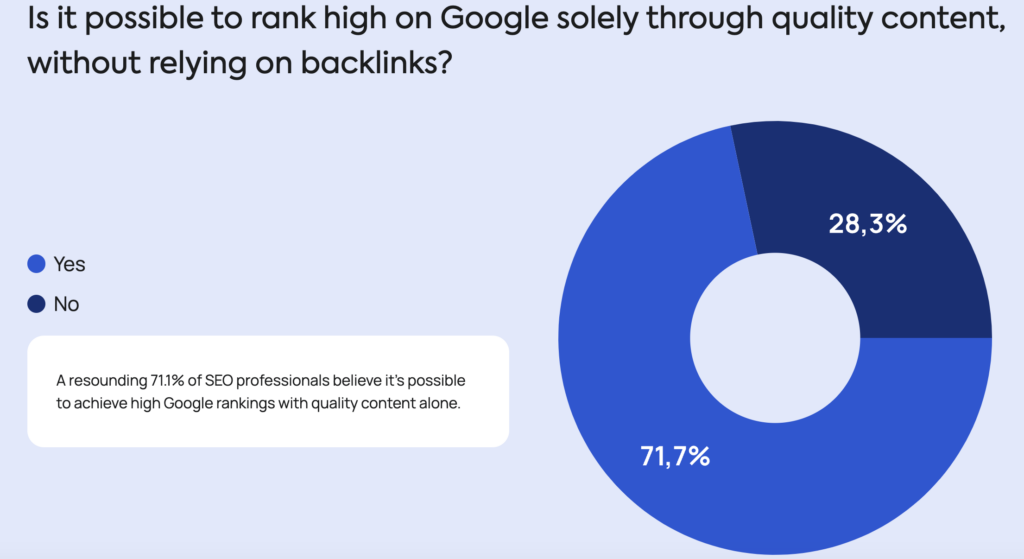
This continuous growth signals to Google that your site is active and evolving, which can improve your rankings, along with your ROI and traffic flows.
Improves brand recognition and exposure
When other websites link to your content, it's like getting a public shout-out. These links help spread your name across the web, making your brand more familiar and trusted.
The more people see your site mentioned, the more they’ll start to see you as an authority in your field. This growing recognition can lead to more visitors, followers, and eventually, more clients.
4 Easy Ways to Build Natural Backlinks
We've discovered that the following methods work best for building natural backlinks.
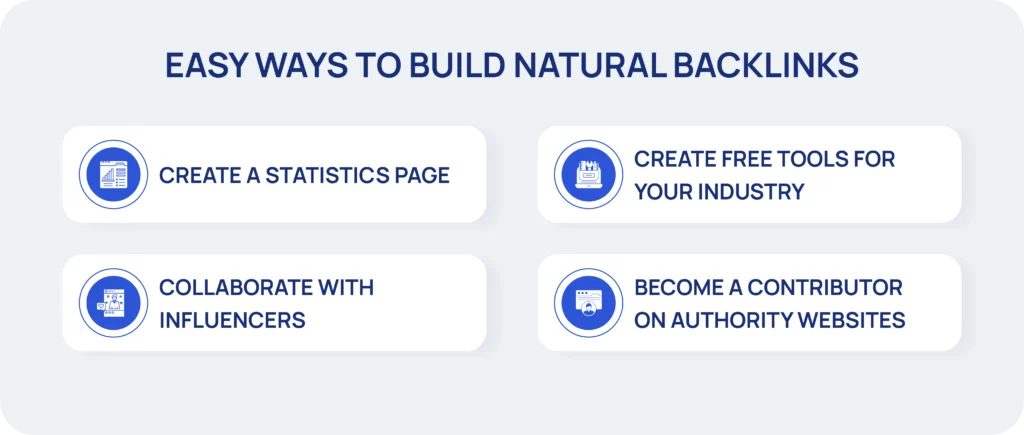
Create a statistics page AKA linkable asset
Creating a comprehensive statistics page can attract a lot of backlinks.
For instance, our Link Building Statistics in 2024 report has been quite successful.
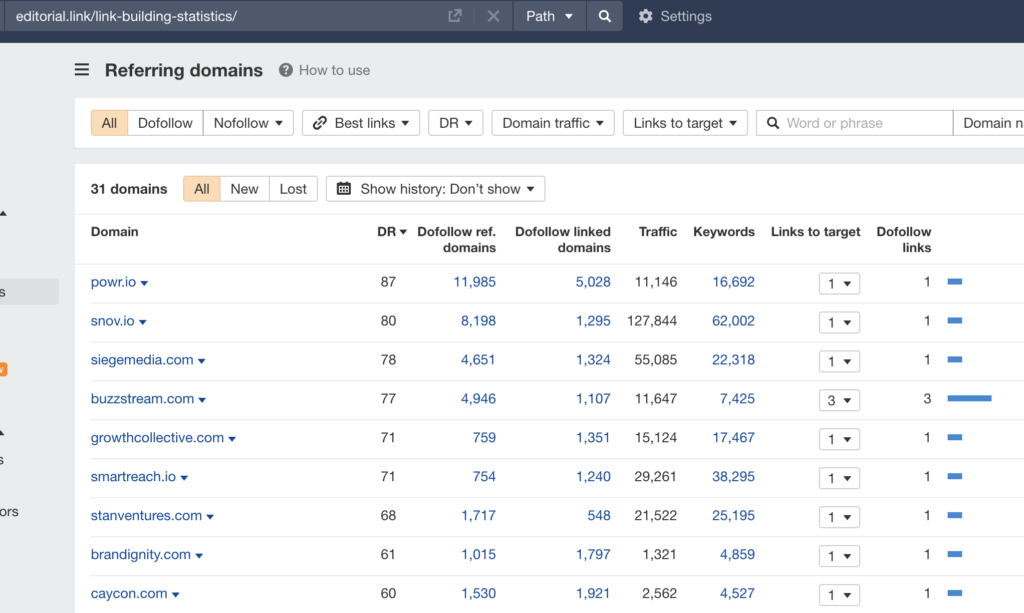
By providing up-to-date and valuable data, we've already attracted a few solid backlinks. And we’re only getting started here!
Collaborate with influencers
Working with influencers in your niche is another effective strategy. This is an advanced form of blogger outreach where you collaborate with industry leaders.
These influencers can mention your content, tools, or statistics in their posts, leading to natural backlinks. Building these relationships can amplify your reach and credibility.
Become a contributor on authority websites
Contributing valuable content to high-authority websites can also help you gain natural backlinks. When you post useful and engaging articles on top sites, you not only reach a wider audience but also earn backlinks from reputable sources.
For example, following the guidelines for writing content on sites like Forbes, Moz, or Search Engine Journal can help you get published and linked back to your site.
Bonus Tactics to Get Natural Backlinks
Here are some extra tips to build natural backlinks in a way that feels easy:
Get experts involved
Do expert roundups. Ask industry pros to share their opinions or tips on a topic.
Once you publish, they'll likely share it on their sites and social media, bringing you natural backlinks and added credibility.
Host webinars
Hosting webinars with industry experts is a fantastic way to attract natural backlinks. Think of these online events as interactive sessions where you share valuable insights and practical tips.
Platforms like YouTube are perfect for this.
When you share content that people really find useful, attendees often link back to the event page or the recorded webinar as a resource.
Be sure to promote your webinars all over your website and through email newsletters to reach as many people as possible and boost your chances of getting those valuable backlinks.
Just be careful not to overdo it with the newsletters, so you don't end up in the spam box.
Guest posting
Writing or using guest posts services for niche blogs can be incredibly beneficial, sometimes even more than writing for big, high-authority sites.
Smaller blogs often have a tight-knit, loyal audience that's super relevant to your niche. They're usually more open to guest contributions too.
By sharing your know-how through well-written guest posts, you can really make a name for yourself in your field. Plus, these posts naturally pull in backlinks because the blog’s readers find your content helpful and worth sharing.
Be active on social media
Engage in social media and online communities. Share your content, answer questions, and participate in discussions on Reddit and Quora.
When you provide valuable insights, people will naturally link back to your site.
By using these simple and natural tactics, you can build more backlinks, drive traffic, and improve your site's SEO in a way that feels genuine and effective.
Ready to level up your site's authority with natural backlinks? At Editorial.Link, our approach ensures your backlinks are high-quality, relevant, and compliant with Google’s guidelines, generating sustainable traffic flows and improving your ROI.
Final Words
Natural link building is key to SEO success.
Focus on creating high-quality content and building genuine relationships. Use strategies like creating linkable assets, offering free tools, collaborating with influencers, and contributing to authority sites to attract natural backlinks.
Consistency and authenticity are vital.
The more effort you put into valuable content and relationships, the more natural backlinks you'll get. This boosts your site’s authority, drives organic traffic, and improves your ROI.

